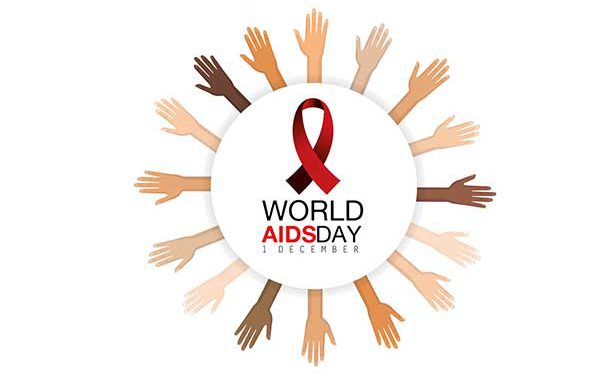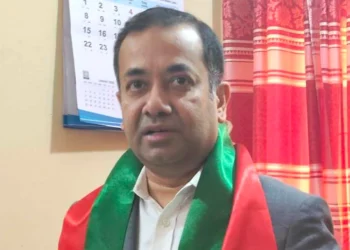Md Hasanur Rahman Tanzir – In Khulna, 83 people have been diagnosed with HIV-AIDS through blood tests conducted at the Khulna Medical College (KHUMEC) Hospital ART Center in the last one year. Of these, 59 are men, 24 are women and 3 are children. During this time, 22 people have died from this deadly disease.
Among the newly infected with this virus, homosexuals, sex workers and people who received blood from unsafe blood transfusions are more. The previous year, 71 people were diagnosed with HIV from that center. World AIDS Day will be celebrated in Khulna today amidst such a dire situation. This time the theme is ‘If rights are ensured, HIV/AIDS will go away’. On the occasion of the day, a two-day camping will be held at Khulna General Hospital at the initiative of the Civil Surgeon of Khulna for the purpose of AIDS prevention and awareness.
Meanwhile, public health is being threatened day by day due to the sale of contaminated blood. In the hope of recovery, patients are carrying all the deadly viruses in the blood purchased from blood banks. Terrible pathogens are spreading through blood. The risk of contracting the deadly diseases HIV AIDS is increasing. According to experts, pregnant mothers, newborns and thalassemia patients are most at risk from blood transfusion. According to them, all the deadly viruses are found in the blood collected from professional blood donors. These include hepatitis-B and C, HIV (AIDS), malaria, syphilis, anemia and various diseases. In the existing situation, blood is being transfused after the patient buys the bag. In this case, blood is being given to the patient without the five essential tests. Due to which the blood recipients are more affected by those deadly diseases.
Dr. Deep Kumar Das, ART focal person at Khulna Medical College (KHUMEC) Hospital, said, there is a system for HIV testing in 23 districts of Bangladesh. Children who are HIV positive have acquired the disease at birth. And a group of young people are homosexuals. Many of them have a history of sexual abuse in childhood. When they come to us, they themselves are habitual homosexuals. Now they are getting acquainted through social media and various apps, looking for partners. In this, they are associating with complete strangers. Many are getting infected. To prevent infection, various programs must be taken, including ensuring HIV-AIDS treatment among intravenous drug users, sex workers, third genders and homosexuals in government hospitals of the country; eliminating the prejudices, misconceptions and discrimination that exist among the general public about the HIV-AIDS-infected population.
Divesh Ojha, Counselor-cum-Administrator of ART Center at Khumek Hospital, said that from November 2023 to October 2024, a total of 83 people were found HIV/AIDS positive in Khulna division and other districts through blood tests of 1,547 people. Of these, 59 are men and 24 are women. There are also 3 children among them. These identified cases include residents of Khulna, Bagerhat, Jessore, Jhenaidah, Narail, Magura, Pirojpur, Patuakhali, Shariatpur and Barisal districts. According to the information provided by him, among those who tested positive for HIV/AIDS, 30 people were found to be HIV/AIDS positive in Khulna (24 men, 6 women), 14 in Bagerhat (9 men, 5 women), two in Gopalganj (2 men), 10 in Jessore (7 men, 3 women), two in Jhenaidah (2 men), 9 in Narail (7 men, 2 women), 4 in Pirojpur (3 men, 1 woman), one woman in Magura, one woman in Patuakhali, one man in Shariatpur and one man in Barisal.
A total of 22 people died during this period. Of these, 16 were men and 6 were women. Among the deaths, 7 people (7 males) died in Khulna, 6 in Bagerhat, 3 in Satkhira, 2 in Jessore, 1 in Pirojpur, 1 in Gopalganj, 1 in Narail and 1 in Barguna. Among those identified, there are homosexuals, sex workers, people who received blood from unsafe blood sources and thalassemia patients. Of these, the number of people through unsafe sex is 54. Of these, homosexuals and male-female sex workers are 36. Of these, homosexuals are 16. In addition, there are 10 unsafe blood recipients.
Among those who are HIV positive (1 male and 9 female). Among the identified, there are 3 people in Khulna, 3 in Bagerhat, 1 in Jessore, 1 in Patuakhali, 1 in Pirojpur and 1 in Satkhira. Among the institutions against which there are complaints of unsafe blood, the name of a diagnostic center in Khulna, Satkhira and Jessore comes up. According to the history of those identified, they take blood from all those places as per their needs. After taking blood from them, thalassemia patients and cesarean patients who are in urgent need have been identified as HIV positive.
According to the ART source of Khumek Hospital, this year a total of 30 newly referred patients are receiving ART services at Khumek Hospital. Of these, 22 are from Ahsania Mission, 4 from Dhaka Tuberculosis Infectious Disease Hospital, and 2 from BSMMU. 1 person is coming from Chittagong Medical College Hospital and 1 person from Ashar Alo NGO. Accordingly, 113 new HIV positive people have been found in the last one year. From 2010 to 2024, the total number of patients with ID from the ART Center at Khumek Hospital is 741. Of these, the number of regular patients is 432. The number of deceased patients is 96. So far, a total of 163 patients have been referred from ART.
It is known that government regulations are not being followed in blood transfusion. The mandatory 5 tests prescribed for donating blood from one person’s body to another’s body are not being conducted. Blood is being taken after only two tests. The lives of the blood recipient are at high risk due to the ignorance of the patient and his relatives, blood donors, hospitals and doctors. Patients suffering from various diseases, surgeries during pregnancy, accidents, anemia and thalassemia usually receive blood.
There are provisions for fines and rigorous imprisonment for violating the Blood Transfusion Act. But most of the medical professionals are not aware of this law. Medical professionals believe that the local health department’s activities in implementing the Safe Blood Transfusion Act-2002 will provide some relief from this situation. It is worth noting that 65 people were identified in 2022, 71 in 2023 and 83 in 2024.




















